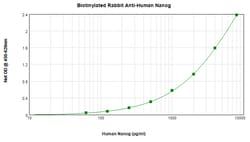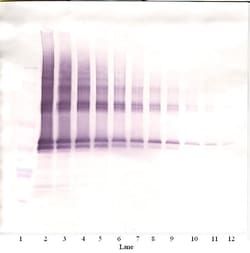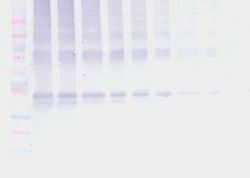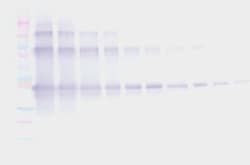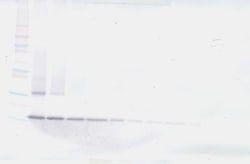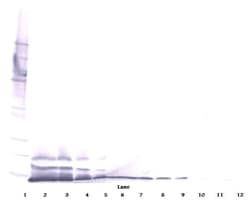500P236BT25
Nanog Polyclonal Antibody, Biotin, PeproTech®, Invitrogen™
Manufacturer: Fischer Scientific
Select a Size
| Pack Size | SKU | Availability | Price |
|---|---|---|---|
| Each of 1 | 500P236BT25-Each-of-1 | In Stock | ₹ 20,203.00 |
500P236BT25 - Each of 1
In Stock
Quantity
1
Base Price: ₹ 20,203.00
GST (18%): ₹ 3,636.54
Total Price: ₹ 23,839.54
Antigen
Nanog
Classification
Polyclonal
Conjugate
Biotin
Gene
NANOG
Gene Alias
2410002E02Rik; early embryo specific expression NK family; early embryo specific expression NK-type homeobox protein; Ecat4; ENK; ES cell-associated protein 4; FLJ12581; HGNC:20857; hNanog; Homeobox protein NANOG; homeobox transcription factor Nanog; homeobox transcription factor Nanog-delta 48; Nanog; Nanog homeobox
Host Species
Rabbit
Purification Method
Antigen affinity chromatography
Regulatory Status
RUO
Gene ID (Entrez)
79923
Content And Storage
-20°C
Applications
ELISA, Western Blot
Concentration
0.1-1.0 mg/mL
Formulation
PBS with no preservative
Gene Accession No.
Q9H9S0
Gene Symbols
NANOG
Immunogen
E.coli-derived, 34.5 kDa Recombinant Human Nanog
Quantity
25 μg
Primary or Secondary
Primary
Target Species
Human
Form
Lyophilized
Description
- AA Sequence of recombinant protein: SVDPACPQSL PCFEASDCKE SSPMPVICGP EENYPSLQMS SAEMPHTETV SPLPSSMDLL IQDSPDSSTS PKGKQPTSAE NSVAKKEDKV PVKKQKTRTV FSSTQLCVLN DRFQRQKYLS LQQMQELSNI LNLSYKQVKT WFQNQRMKSK RWQKNNWPKN SNGVTQKASA PTYPSLYSSY HQGCLVNPTG NLPMWSNQTW NNSTWSNQTQ NIQSWSNHSW NTQTWCTQSW NNQAWNSPFY NCGEESLQSC MQFQPNSPAS DLEAALEAAG EGLNVIQQTT RYFSTPQTMD LFLNYSMNMQ PEDV
- Preparation: Produced from sera of rabbits immunized with highly pure Recombinant Human Nanog
- Anti-Human Nanog-specific antibody was purified by affinity chromatography and then biotinylated
- Sandwich ELISA: To detect hNanog by sandwich ELISA (using 100 μL/well antibody solution) a concentration of 0.25-1.0 μg/mL of this antibody is required
- This biotinylated polyclonal antibody, in conjunction with PeproTech Polyclonal Anti-Human Nanog (500-P236) as a capture antibody, allows the detection of at least 0.2-0.4 ng/well of Recombinant hNanog
- Western Blot: To detect hNanog by Western Blot analysis this antibody can be used at a concentration of 0.1-0.2 μg/mL
- Used in conjunction with compatible secondary reagents the detection limit for Recombinant hNanog is 1.5-3.0 ng/lane, under either reducing or non-reducing conditions
- 500-P236BT-1MG will be provided as 2 x 500 μg NANOG (Nanog homeobox) is a divergent homeodomain protein that directs pluripotency and differentiation of undifferentiated embryonic stem cells
- NANOG mRNA is present in pluripotent mouse and human cell lines, and absent from differentiated cells
- Human NANOG protein shares 52% overall amino acid identity with the mouse protein, and 85% identity in the homeodomain
- Human NANOG maps to gene locus 12p13.31, while the mouse NANOG maps to gene loci 6 F2
- Murine embryonic NANOG expression is detected in the inner cell mass of the blastocyst
- Research studies have shown that high levels of human NANOG expression in the undifferentiated N-Tera embryonal carcinoma cell line
- Further, NANOG is a transcription regulator involved in inner cell mass and embryonic stem (ES) cells proliferation and self-renewal
- The role of NANOG in embryonic development suggested that it might be useful in the creation of stem cells that might be useful in cell replacement therapies in the treatment of several degenerative diseases
- Artificial stem cells, termed induced pluripotent stem (iPS) cells, can be created by expressing POU5F1 (also known as Oct-4), another germline-specific transcription factor, and the transcription factors Sox2, Klf4 and Lin28 along with c-Myc in mouse fibroblasts
- Experiments have demonstrated that iPS cells could be generated using expression plasmids expressing NANOG, Sox2, KlfF4 and c-Myc, eliminating the need for virus introduction, thereby addressing a safety concern for potential use of iPS cells in regenerative medicine
- When overexpressed, NANOG promotes cells to enter into S phase and proliferation
- Diseases associated with dysfunction in the NANOG protein include tetracarcinoma and germ cell/embryonal cancer.
Compare Similar Items
Show Difference
Antigen: Nanog
Classification: Polyclonal
Conjugate: Biotin
Gene: NANOG
Gene Alias: 2410002E02Rik; early embryo specific expression NK family; early embryo specific expression NK-type homeobox protein; Ecat4; ENK; ES cell-associated protein 4; FLJ12581; HGNC:20857; hNanog; Homeobox protein NANOG; homeobox transcription factor Nanog; homeobox transcription factor Nanog-delta 48; Nanog; Nanog homeobox
Host Species: Rabbit
Purification Method: Antigen affinity chromatography
Regulatory Status: RUO
Gene ID (Entrez): 79923
Content And Storage: -20°C
Applications: ELISA, Western Blot
Concentration: 0.1-1.0 mg/mL
Formulation: PBS with no preservative
Gene Accession No.: Q9H9S0
Gene Symbols: NANOG
Immunogen: E.coli-derived, 34.5 kDa Recombinant Human Nanog
Quantity: 25 μg
Primary or Secondary: Primary
Target Species: Human
Form: Lyophilized
Antigen:
Nanog
Classification:
Polyclonal
Conjugate:
Biotin
Gene:
NANOG
Gene Alias:
2410002E02Rik; early embryo specific expression NK family; early embryo specific expression NK-type homeobox protein; Ecat4; ENK; ES cell-associated protein 4; FLJ12581; HGNC:20857; hNanog; Homeobox protein NANOG; homeobox transcription factor Nanog; homeobox transcription factor Nanog-delta 48; Nanog; Nanog homeobox
Host Species:
Rabbit
Purification Method:
Antigen affinity chromatography
Regulatory Status:
RUO
Gene ID (Entrez):
79923
Content And Storage:
-20°C
Applications:
ELISA, Western Blot
Concentration:
0.1-1.0 mg/mL
Formulation:
PBS with no preservative
Gene Accession No.:
Q9H9S0
Gene Symbols:
NANOG
Immunogen:
E.coli-derived, 34.5 kDa Recombinant Human Nanog
Quantity:
25 μg
Primary or Secondary:
Primary
Target Species:
Human
Form:
Lyophilized
Antigen: Nanog
Classification: Polyclonal
Conjugate: Biotin
Gene: NANOG
Gene Alias: 2410002E02Rik; early embryo specific expression NK family; early embryo specific expression NK-type homeobox protein; Ecat4; ENK; ES cell-associated protein 4; FLJ12581; HGNC:20857; hNanog; Homeobox protein NANOG; homeobox transcription factor Nanog; homeobox transcription factor Nanog-delta 48; Nanog; Nanog homeobox
Host Species: Rabbit
Purification Method: Antigen affinity chromatography
Regulatory Status: RUO
Gene ID (Entrez): 79923
Content And Storage: -20°C
Applications: ELISA, Western Blot
Concentration: 0.1-1.0 mg/mL
Formulation: PBS with no preservative
Gene Accession No.: Q9H9S0
Gene Symbols: NANOG
Immunogen: E.coli-derived, 34.5 kDa Recombinant Human Nanog
Quantity: 50 μg
Primary or Secondary: Primary
Target Species: Human
Form: Lyophilized
Antigen:
Nanog
Classification:
Polyclonal
Conjugate:
Biotin
Gene:
NANOG
Gene Alias:
2410002E02Rik; early embryo specific expression NK family; early embryo specific expression NK-type homeobox protein; Ecat4; ENK; ES cell-associated protein 4; FLJ12581; HGNC:20857; hNanog; Homeobox protein NANOG; homeobox transcription factor Nanog; homeobox transcription factor Nanog-delta 48; Nanog; Nanog homeobox
Host Species:
Rabbit
Purification Method:
Antigen affinity chromatography
Regulatory Status:
RUO
Gene ID (Entrez):
79923
Content And Storage:
-20°C
Applications:
ELISA, Western Blot
Concentration:
0.1-1.0 mg/mL
Formulation:
PBS with no preservative
Gene Accession No.:
Q9H9S0
Gene Symbols:
NANOG
Immunogen:
E.coli-derived, 34.5 kDa Recombinant Human Nanog
Quantity:
50 μg
Primary or Secondary:
Primary
Target Species:
Human
Form:
Lyophilized
Antigen: CXCL14
Classification: Polyclonal
Conjugate: Unconjugated
Gene: Cxcl14
Gene Alias: 1110031L23Rik; 1200006I23Rik; AI414372; B-cell and monocyte-activating chemokine; BMAC; bolekine; BRAK; breast and kidney; C Cmotif chemokine; C X C motif chemokine; CC motif chemokine; CCmotif chemokine; chemokine (C-X-C motif) ligand 14; chemokine BRAK; CXC; CXC chemokine in breast and kidney; CXC motif chemokine; C-X-C motif chemokine 14; C-X-C motif chemokine ligand 14; CXCL; Cxcl14; hypothetical protein LOC511771; Kec; Kidney-expressed chemokine CXC; KS1; MGC10687; MIP-2 gamma; MIP2G; MIP-2g; MIP2gamma; musculus CXC chemokine MIP-2gamma; NJAC; PSEC0212; SCYB14; small inducible cytokine B14; small inducible cytokine subfamily B (Cys-X-Cys), member 14; small inducible cytokine subfamily B (Cys-X-Cys), member 14 (BRAK); small-inducible cytokine B14; tumor-suppressing chemokine; UNQ240/PRO273
Host Species: Rabbit
Purification Method: Antigen affinity chromatography
Regulatory Status: RUO
Gene ID (Entrez): 9547
Content And Storage: -20°C
Applications: ELISA, Western Blot
Concentration: 0.1-1.0 mg/mL
Formulation: PBS with no preservative
Gene Accession No.: O95715
Gene Symbols: Cxcl14
Immunogen: E.coli-derived Recombinant Human BRAK (CXCL14)
Quantity: 100 μg
Primary or Secondary: Primary
Target Species: Human
Form: Lyophilized
Antigen:
CXCL14
Classification:
Polyclonal
Conjugate:
Unconjugated
Gene:
Cxcl14
Gene Alias:
1110031L23Rik; 1200006I23Rik; AI414372; B-cell and monocyte-activating chemokine; BMAC; bolekine; BRAK; breast and kidney; C Cmotif chemokine; C X C motif chemokine; CC motif chemokine; CCmotif chemokine; chemokine (C-X-C motif) ligand 14; chemokine BRAK; CXC; CXC chemokine in breast and kidney; CXC motif chemokine; C-X-C motif chemokine 14; C-X-C motif chemokine ligand 14; CXCL; Cxcl14; hypothetical protein LOC511771; Kec; Kidney-expressed chemokine CXC; KS1; MGC10687; MIP-2 gamma; MIP2G; MIP-2g; MIP2gamma; musculus CXC chemokine MIP-2gamma; NJAC; PSEC0212; SCYB14; small inducible cytokine B14; small inducible cytokine subfamily B (Cys-X-Cys), member 14; small inducible cytokine subfamily B (Cys-X-Cys), member 14 (BRAK); small-inducible cytokine B14; tumor-suppressing chemokine; UNQ240/PRO273
Host Species:
Rabbit
Purification Method:
Antigen affinity chromatography
Regulatory Status:
RUO
Gene ID (Entrez):
9547
Content And Storage:
-20°C
Applications:
ELISA, Western Blot
Concentration:
0.1-1.0 mg/mL
Formulation:
PBS with no preservative
Gene Accession No.:
O95715
Gene Symbols:
Cxcl14
Immunogen:
E.coli-derived Recombinant Human BRAK (CXCL14)
Quantity:
100 μg
Primary or Secondary:
Primary
Target Species:
Human
Form:
Lyophilized
Antigen: CXCL14
Classification: Polyclonal
Conjugate: Unconjugated
Gene: Cxcl14
Gene Alias: 1110031L23Rik; 1200006I23Rik; AI414372; B-cell and monocyte-activating chemokine; BMAC; bolekine; BRAK; breast and kidney; C Cmotif chemokine; C X C motif chemokine; CC motif chemokine; CCmotif chemokine; chemokine (C-X-C motif) ligand 14; chemokine BRAK; CXC; CXC chemokine in breast and kidney; CXC motif chemokine; C-X-C motif chemokine 14; C-X-C motif chemokine ligand 14; CXCL; Cxcl14; hypothetical protein LOC511771; Kec; Kidney-expressed chemokine CXC; KS1; MGC10687; MIP-2 gamma; MIP2G; MIP-2g; MIP2gamma; musculus CXC chemokine MIP-2gamma; NJAC; PSEC0212; SCYB14; small inducible cytokine B14; small inducible cytokine subfamily B (Cys-X-Cys), member 14; small inducible cytokine subfamily B (Cys-X-Cys), member 14 (BRAK); small-inducible cytokine B14; tumor-suppressing chemokine; UNQ240/PRO273
Host Species: Rabbit
Purification Method: Antigen affinity chromatography
Regulatory Status: RUO
Gene ID (Entrez): 9547
Content And Storage: -20°C
Applications: ELISA, Western Blot
Concentration: 0.1-1.0 mg/mL
Formulation: PBS with no preservative
Gene Accession No.: O95715
Gene Symbols: Cxcl14
Immunogen: E.coli-derived Recombinant Human BRAK (CXCL14)
Quantity: 1 mg
Primary or Secondary: Primary
Target Species: Human
Form: Lyophilized
Antigen:
CXCL14
Classification:
Polyclonal
Conjugate:
Unconjugated
Gene:
Cxcl14
Gene Alias:
1110031L23Rik; 1200006I23Rik; AI414372; B-cell and monocyte-activating chemokine; BMAC; bolekine; BRAK; breast and kidney; C Cmotif chemokine; C X C motif chemokine; CC motif chemokine; CCmotif chemokine; chemokine (C-X-C motif) ligand 14; chemokine BRAK; CXC; CXC chemokine in breast and kidney; CXC motif chemokine; C-X-C motif chemokine 14; C-X-C motif chemokine ligand 14; CXCL; Cxcl14; hypothetical protein LOC511771; Kec; Kidney-expressed chemokine CXC; KS1; MGC10687; MIP-2 gamma; MIP2G; MIP-2g; MIP2gamma; musculus CXC chemokine MIP-2gamma; NJAC; PSEC0212; SCYB14; small inducible cytokine B14; small inducible cytokine subfamily B (Cys-X-Cys), member 14; small inducible cytokine subfamily B (Cys-X-Cys), member 14 (BRAK); small-inducible cytokine B14; tumor-suppressing chemokine; UNQ240/PRO273
Host Species:
Rabbit
Purification Method:
Antigen affinity chromatography
Regulatory Status:
RUO
Gene ID (Entrez):
9547
Content And Storage:
-20°C
Applications:
ELISA, Western Blot
Concentration:
0.1-1.0 mg/mL
Formulation:
PBS with no preservative
Gene Accession No.:
O95715
Gene Symbols:
Cxcl14
Immunogen:
E.coli-derived Recombinant Human BRAK (CXCL14)
Quantity:
1 mg
Primary or Secondary:
Primary
Target Species:
Human
Form:
Lyophilized
